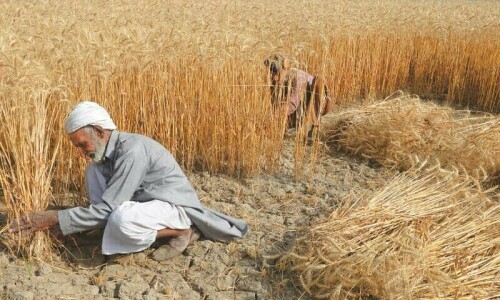WASHINGTON, Nov 26: President George Bush on Monday appeared to widen the scope of his concept of the US-led war on terrorism by indicating that any country that developed weapons of mass destruction which threatened other nations could also be a target.
He referred to both Iraq and North Korea while formulating his new definition in reply to reporters’ questions at the White House during a welcoming ceremony for two American missionary aid workers held by the Taliban and freed earlier this month.
The president, asked whether the campaign against terrorism could be extended to Iraq, first hedged giving a clear answer and took shelter behind his often-repeated statement that anyone who harboured a terrorist would be considered a terrorist, and said first things should be taken up first.
But, then, as questions on Iraq persisted, Mr Bush said Afghanistan was still just the beginning, and warned Iraq against developing weapons of mass destruction, saying it would be held accountable for that. He asked Baghdad to let in United Nations inspectors to ensure that it was not acquiring such weapons. The president said North Korea should also permit inspectors to find out whether it was developing weapons of mass destruction.
The president denied that he was changing or widening his definition of the anti-terror campaign, but this seems to be the first time that acquisition or possession of weapons of mass destruction has become what might be called a cognizable offence, although Mr Bush implied that he meant weapons that could pose a threat to others.
The president’s remarks came hours after the first large-scale presence of conventional ground troops was reported in Afghanistan, with over 1,000 Marines occupying an area just outside Kandahar, usually referred to as the spiritual headquarters of the Taliban movement, leading to a general expectation that the Afghan operation may not be too far from a conclusion.
There has been persistent pressure from the Republican right wing for America to dislodge President Saddam Hussein and thus end what has been referred to as the unfinished agenda of the Gulf War. The proposal is said to enjoy the backing of elements within Mr Bush’s own administration.
However, sobrer sections in the media and Congress have been advising against any hasty flights of fancy in the realm of foreign affairs and moves against Iraq. The New York Times in an editorial on Monday said that this would be the wrong time to fight Iraq because it would lead to cracks in the coalition now backing America.
The newspaper urged the US to pursue the alternative course of helping the Iraqi opposition, and said the challenge of removing President Saddam Hussein should be “best left for a day when the United States can count on the strong and effective support of opposition forces in Iraq”.
Asked what would happen if Iraq refused to permit UN weapons inspectors to return, Mr Bush said Mr Saddam Hussein “will find out”.
In seeking to explain Mr Bush’s remarks on Iraq and North Korea, White House press secretary Ari Fleischer later said the two countries were already on the US state department’s list of states deemed to be sponsoring terrorism, and the president was merely reiterating that position.
The president, Mr Fleischer said, had merely pointed out that if Iraq and North Korea developed weapons of mass destruction and then used them to terrorize others, they would be held accountable.
Asked whether permitting UN weapons inspectors back into Iraq should be seen as an ultimatum, Mr Fleischer said Mr Bush was reiterating a long-standing US policy on weapons inspections.
PAKISTAN: President Bush was also asked about the possibility of Taliban fighters going into Pakistan, when he said that “we’ve had good discussions with Pakistan” on this issue and Pakistan had indicated that it would fully cooperate.
Islamabad had earlier denied reports that it had sent in military aircraft to evacuate Pakistanis among the besieged Taliban fighters in Kunduz.
Pakistanis were among the Taliban prisoners in Mazar-i-Sharif who staged a brief but bloody rebellion against their Northern Alliance captors in a fortress prison on Sunday.
Defence secretary Donald Rumsfeld also said he doubted whether any planes had flown into Kunduz and evacuated any Taliban fighters, and the chairman of the joints chiefs of staff, General Richard Myers, pointed out that the airstrip in Kunduz was too short to take any of the kind of planes envisaged.
The two were addressing the daily Pentagon briefing on Monday afternoon. Mr Rumsfeld said there had been a long and hard battle in Kunduz with many casualties, and, contrary to earlier reports, he suggested that the situation in the Mazar-i- Sharif prison was still fluid.
The prisoners’ revolt there had not been entirely quelled, and airstrikes were being carried out. Five US servicemen were injured in the prison compound on Sunday when a bomb dropped from a US plane exploded close to them. The servicemen’s injuries were described as serious and they were flown out for treatment to Uzbekistan.














































Dear visitor, the comments section is undergoing an overhaul and will return soon.